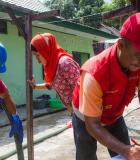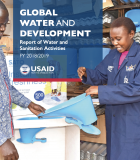Haiti’s vulnerability to natural disasters such as earthquakes, hurricanes, and flooding have complicated efforts to repair, expand, and sustain access to safe water and sanitation. The low levels of water and sanitation services and poor hygiene practices contributed substantially to the severity and rapid spread of the cholera epidemic in 2010. Hurricane Matthew in 2016 further compromised the fragile WASH sector in affected areas. The Centers for Disease Control and Prevention (CDC) and USAID have collaborated on improving WASH in Haiti, with each agency bringing complementary strengths to the effort.
CDC has been providing technical assistance to the National Water and Sanitation Directorate and other partners on WASH since 2010 when two separate emergencies—a major earthquake and the start of the ongoing cholera outbreak—affected Haiti. That in-depth experience allowed CDC to provide valuable input for the design and implementation of USAID’s Haiti Water and Sanitation Project, which focuses on priority cholera hotspot communes and those recovering from cyclical disasters, and aims to build the capacity of governments and service providers to expand water distribution and sanitation services. The CDC/USAID collaboration has included identifying how USAID can contribute to advancing the Government of Haiti’s Plan for the Elimination of Cholera—a plan that encourages both agencies, other donors, the government, and the private sector to work together to accelerate improvements to increase access to safe water and adequate sanitation by 2022.






